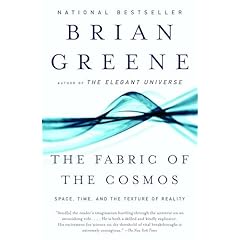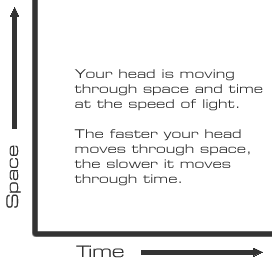Why time slows down when approaching the Speed of Light.
 Thu, July 12, 2007 at 3:48 PM
Thu, July 12, 2007 at 3:48 PM  Ok, so you’ve heard that nothing can travel faster than the speed of light. (That’s not quite true. The expansion of the universe allows for faster than light travel but that’s another post.) You’re also aware that time slows down the closer you get to the speed of light. You know, the ‘One twin goes off to Alpha Centauri at the speed of light and comes back after 80,000 years but he’s only aged 3 months’ story.
Ok, so you’ve heard that nothing can travel faster than the speed of light. (That’s not quite true. The expansion of the universe allows for faster than light travel but that’s another post.) You’re also aware that time slows down the closer you get to the speed of light. You know, the ‘One twin goes off to Alpha Centauri at the speed of light and comes back after 80,000 years but he’s only aged 3 months’ story.
Ever wonder why? Here’s the crib notes.
Everything in the universe always travels exactly at Light Speed. Always.
Time dilation: Special relativity declares a law for all motion: The combined speed of any object’s motion through space and it’s motion though time is always precisely equal to the speed of light.
 That’s right, everything. You, me, the computer screen you’re looking at, your grandma’s French toast, Santa Clause… everything.
That’s right, everything. You, me, the computer screen you’re looking at, your grandma’s French toast, Santa Clause… everything.
Everything is traveling through Spacetime: space (the three dimensions we experience and the nine others that m-theory predicts) and time.
Adding the total movement through both space and time always equals light speed. Always. Always. Always.
Space and Time do not exist seperately, the are parts of the same thing, Spacetime.
Since you must travel constantly at exactly the speed of light, when you increase your speed through space, you decrease your speed through time.
Your head (and the rest of you) is traveling through spacetime at the speed of light. But, when you’re at rest (not accelerating) all of your head’s movement is through time, none of it is traveling (accelerating) through space. Every time your head moves (accelerates) through space; in a car, in a plane, in a spaceship… even nodding up and down, some of it’s movement in time is lost since it is now moving through space.
Cool huh.
What about light?
Since light waves use all of their motion to travel through space at Light Speed, they have absolutely no motion through Time. Every photon that has ever been produced exists in an ageless state. (To us, the light seems to move through time but to the photon, time is standing still. This is one of the seemingly odd realizations fo Ensteins Theory of Relativity.) That's why poton's from the early universe don't 'fade out' or do something else. They can't, since for them, time is at a standstill.
The universe ages, light does not.
 83 Comments | | posted in
83 Comments | | posted in  Science | tagged
Science | tagged  Light Speed,
Light Speed,  Time Dilation,
Time Dilation,  Why Time Slows Down Near Light Speed
Why Time Slows Down Near Light Speed 


Reader Comments (83)
If you are driving a car at 1m/ph you will go slower than a car going at 2 m/ph (which is obvious).
This is because you travel a further distance in a shorter amount of time if you reach a faster speed than something in relation to you.
So, fast velocity=slower time and slower velocity=faster/longer time.
Hope this helped because this just popped up in my mind after reading some of the comments.
If all of you thought of this already, great!
If not, then this could be of great use to you.
When you are travelling in an aeroplane and you look down and it seems that you are not going anywhere and it fells like you are stationery,but people standing down on the ground see the aeroplane moving rapidly in the sky . The time on the aeroplane feels slow, while on the earth it is fast. this is because the time in aeroplane is 0.00000....(i dont know) seconds slow than that on the ground.If you could travel at about speed of light in a aeroplane("Which is not possible duh!) the difference in time on aeroplane and ground would be huge. For example if you had travelled in that aeroplane for about a month round the world at the speed of light, it would be some years for people on the earth, therefore you would have travelled through time and reached the future!
1. watching a normal 10 min video? In this case, if you stopped the spaceship and returned to where you started once you finished watching the video, it would be 50 mins for the people on earth, 40 mins after they watched same video.
or
2 watching a 10 min video in 50 mins in slow motion? In this case, you would feel the same amount of time elapses no matter where you are, on the groud or the spaceship, wouldn't you? The difference is that those who on the spaceship experienced everything in slow motion.
If time stops at the speed of light, how are we able to measure the speed of light?
If velocity equals distance over time, then distance would have to be divisible by 0, nothing is divisible by 0, therefore would distance cease to exist?
It's hard for me to grasp because I don't have any notion of space-time.
Why does the author use BOTH movement and acceleration as if they're the same thing? Is one the correction of the other, and which is correct? If "Movement" is correct, it begs the question "In relation to what?" I'm moving at nearly the speed of light in relation to the light that has reflected off of me, which makes me consider that "Acceleration" is correct... But, again, in relation to what? It's easy at slow speeds on earth, you can use the surface of the earth closest to your car to say you're driving at 55MPH... But you're also moving around the earth, and around the sun and away from the center of the universe at 10000 times that speed...
In relation to something on the polar opposite of the universe, that would be going the opposite direction, we're moving away at twice again the last speed... Still not 0.1% of the speed of light, but speed is relative. I'm still moving at darn near the speed of light in relation to the light that has recently bounced off my lazy hide.
So if astronauts are in a spaceship at 0.9*c (if only!) relative to Houston mission control, and they communicate via lasers or RF (or any signal 'at' the speed of light), wouldn't the radio frequency in Houston be different from the spaceship? If my intuition were correct, spaceship time would be running slower relative to earth time, thus the broadcast frequency would need to be different from the earth's receiving frequency. Does anyone know if there's any effect of relativity on space communications like this? At 0.9c this could be a major frequency difference, but even at our current spaceship speeds it would likely be a measurable frequency difference.
If this effect does not occur, why not? Does converting the signal from the normal 'perceived time' to light speed somehow eliminate the relativity of the reference frames? Does the speed of light transmission path provide a frame of reference for the signals regardless of the sending to receiving relativity?
Check out this link:
http://en.wikipedia.org/wiki/Lorentz_transformation
I'd like to remind anyone claiming God and the Big Bang are incompatible beliefs, that not too long ago Christians were calling it heresy that the Earth orbits around the Sun... The anti-science movement in our society today is truly disappointing. From the Big Bang, to evolution, to climate change, our progress forward and potentially our future well being will suffer if our children aren't being taught the value (both historically and potentially) of the scientific method.